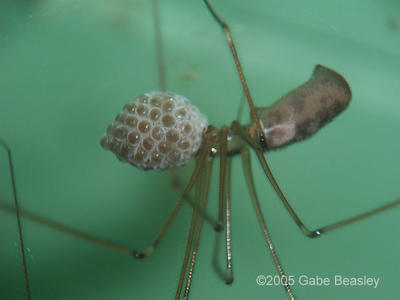
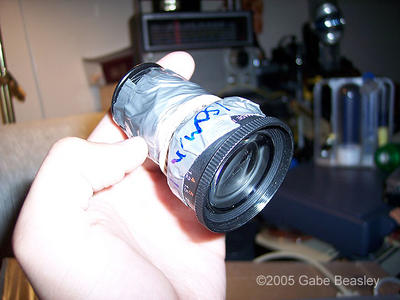
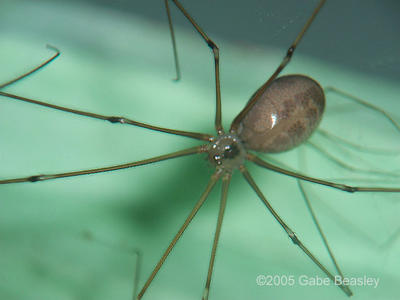
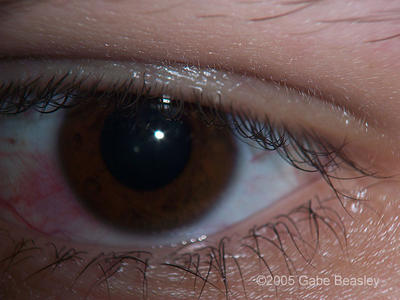
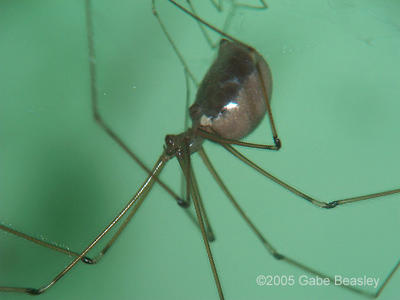
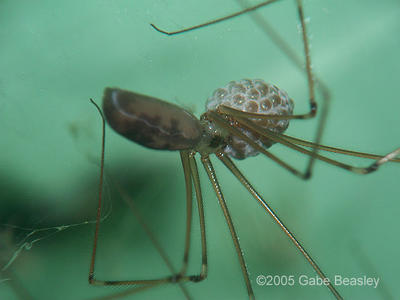 The Daddy Long legs. (Pholcidae) and the less common cribellate spiders the "Cave daddy long legs" (Hypochilidae) are some of my
The Daddy Long legs. (Pholcidae) and the less common cribellate spiders the "Cave daddy long legs" (Hypochilidae) are some of myfavorite spiders. This is the incredibly successful Pholcus phalangioides.
A large female with an egg sack. These were found in my basement where I let them free and am conducting more study of what they eat, I plan to post an article
about what spiders in homes can do to--what basement spiders eat, and why you don't have to and should not kill them. Females hold there egg sacks
in the mouth parts until the babies hatch out. You can see two different ones here.
One which will lay her egg sack an
time now, possibly tonight. I'm going
to setup a video camera on time-laps
to try to capture this event.
The three inch long 180mm "7 inch"(ø45mm) teli-macro lens-finally
gave me the power to photograph the mother daddy long legs and so much
more very clear without having to get really close thus scaring it
into moving. I could work outside of the web.
I'd just built this lens so it was not tested it fully yet when this picture was taken. I had to re-build it twice to get the close spacing tolerances right. The lenses in the film can tube had to be cut with the consider lens
in the middle of the tube. The new
version is also now able to link
too the mechanical optical zoom on
the camera. It does not look very
different now except by being a bit
longer. Under the duct tape is
PACKAGING TAPE and NO GLUE. GLUE and optics do not
mix! Also, duct tape, scotch tape,and electrical tapedegradesvery
fast. The adhesive used in clear
plastic storage & packaging
tape was made to last decades.
I used it under the duct tape. The
duct tape is on there purely to make it look a bit better and I'm going to
remove that and give it my silver
shine from aluminium foil as usual.
It is an all tightly wrapped in packaging tape system with that middle condenser lens (the key to teli-macro like this) is mated with a duel element condenser concave combo. In the front of the lens is accessary threaded so I can probably
at least add filters (ø45mm) and can add anything that matches the threading, like filters.
This holding threaded lens-mounting
system was taken from an old video
camera (broken).
I’m not really sure why I like the daddy longlegs spider so much.
Possibly because they live so well in
homes and I've been watching them
since I was about 5yrs old. The
full sized versions of these pictures are truly amazing. This lens makes it possible to shoot high quality pictures of spiders, insects or anything else macro from a distance of exactly 7 inches with some room to zoom in and out as it does mechanically link to the cameras stock lens. When I figured out to use it--I got a lucky breakthrough. Being 7 inches away most spiders and insects can be photographed even if deep in webs (very important). My other lenses only offer me about 3- 4 inches down to 1.5cm or so. As usual this is one of my entirely homemade lenses. This one is the newest and one of the most useful. Although it's very complex and thus a bit harder to learn how to focus, the problems I had with it early on that almost doomed it were fixed! It is not shown in my gear pictures that have recently been circulated because I had not built it yet. It wont' win a beauty contest on the outside but it is a true optical wonder. It can get high-quality images--all photo optical glass, like these from at least 7 inches away from the subject with no digital cropping & zoom. And it’s high mag, about 15x20mm or so but can get even tighter. It’s perfect for normally sized bugs. It is linked to the cameras mechanical system. The advantage to using a lens like this is clear-- spiders like the Daddy long legs are shy, and often shake in there webs making them hard to shoot when you try to get up close. My other macro lenses could not have done these shots. Seven inches (if you look at it on a ruler is about 18cm). It has two main stages. The lens sticks out from the camera 3 inches . When I measure from the end of the lens (not to include the 3.5 inches going into the CCD) you can clearly focus in on an object optically from 7 inches at the tip of the lens NOT the inside of the camera. This is a real big breakthrough. A really powerful way to catch closeups that would have been nearly impossible or very harmful to living subjects to get.
i am doing a project on dady long legs and i found this picture quite helpful
ReplyDeleteI am glad I could help. Thank you for leaving me a comment. I do like to know my art and science is contributing to education. Tell your family and friends about my site (gabebeas.blogspot.com) and feel free to come back anytime.
ReplyDeleteTo get to my main site--tybe in "Mostly (spacebar) Macros" or my name in Google or Yahoo. The first thing that comes up is nearly always my site. 100s and 100s of my pictures and now 2 insect videos are now avalible. All pictures are G-Rated for the entire family. Have fun!
--Gabe W. Beasley
Nice fill someone in on and this mail helped me alot in my college assignement. Thanks you as your information.
ReplyDelete